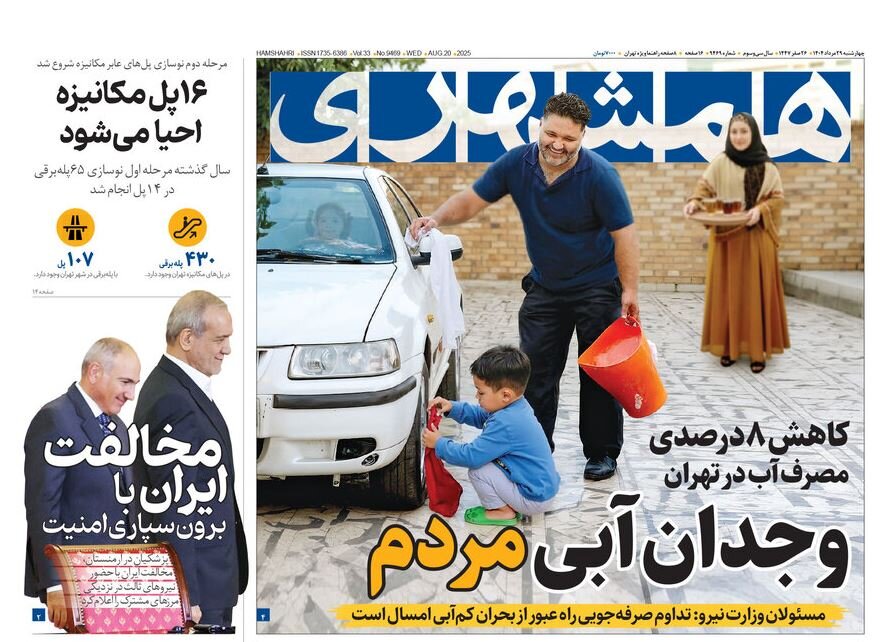Highlights of Pezeshkian’s strategic trip to Armenia

TEHRAN - In a note, Hamshahri discussed President Masoud Pezheshkian's trip to Armenia and wrote: About 10 days after the signing of the peace agreement between Armenia and the Republic of Azerbaijan at the White House (on the establishment of the Zangezur corridor), the President's visit to Yerevan carried special strategic importance.
It included consultations that, in addition to bilateral relations, focused on recent geopolitical developments in the South Caucasus. Iran's emphasis on the need to observe Iran's (security and economic) considerations in the Yerevan-Baku-Washington agreement was one of the most central points raised in the consultations between the two sides. The consultations, considering recent developments in the region, highlighted important points, including a special commitment by the Armenian side, compliance with Iran's considerations, agreement on a strategic document, detailed private talks, and private-sector consultations. Discussions on the Zangezur corridor and Iran's considerations, which were the main focus of the trip, were accompanied by Yerevan's special commitment to Tehran’s interests, stating that the Armenian side has assured that there will be no threat to Iran from its territory.
Etemad: The Zangezur game
In an analysis of the Zanegzur corridor, Etemad wrote: This project is not just a transportation route, but a profound geopolitical development that threatens our economic interests in the short term and limits our regional influence in the long term. Iran must decide today whether it is a spectator, a player, or even a stage manager in this game. The bitter experience of missed opportunities should make Iran aware that in this competition, silence is equivalent to retreating and losing a position that may take more than a century to regain. Iran must adopt a field-based and purposeful approach towards Armenia. This presence should not remain merely in the form of political meetings or symbolic military maneuvers, but be expanded to operational levels in the fields of logistics, intelligence, and military. Iran must move beyond the status of “passive confrontation” in regard to the developments in the Caucasus and reach the doctrine of “active deterrence leadership.” In the evolving global order, effective action requires timely presence, intelligent action, and a correct perception of threats. The Caucasus, in this regard, is not only a threat, rather it can also be a platform for enhancing Iran’s role in global equations, provided that a purely defensive approach is avoided.
Kayhan: Foreign policy lessons from the 12-day war
Kayhan dedicated its editorial to the foreign policy lessons from the 12-day war and wrote: The 12-day war showed that Iran is still facing the reality of strategic isolation. Neither China nor Russia moved beyond cautious positions. This fact shows that relying solely on great powers is a strategic mistake, and a multi-layered foreign policy must be pursued. At the same time, Iran’s membership in the BRICS and the Shanghai Cooperation Organization provided an opportunity to elaborate on the country’s positions on the global stage. The main condition for taking advantage of these opportunities is linking them to real economic projects and cooperation. Another lesson was the importance of media diplomacy. In the early days of the crisis, the Western media narrative was dominant, but with the active involvement of domestic media, the balance changed to some extent. This experience revealed the importance of investing in public and media diplomacy. The 12-day war also highlighted the importance of neighborhood policy. The countries of the region were the first to be affected by the crisis, and their concern about the spread of the war showed that regional diplomacy should be the main focus of Iran’s foreign policy.
Arman-e-Emrooz: Trump’s diplomatic turn towards Iran
Arman-e-Emrooz said in a commentary that Donald Trump is willing to strike a deal with Iran in his second term as president. It wrote: The U.S. President has repeatedly spoken during his second term about his willingness to negotiate with Iran. This approach, which contrasts with his hardline policies during his first term, indicates a change in his strategy towards Iran. However, there are several challenges ahead of possible negotiations. Iran wants an agreement within the framework of the JCPOA, while the Trump team is seeking a more comprehensive agreement that would include not only the nuclear program but also Tehran’s support for resistance groups. The difference in expectations has complicated the negotiations. On the other hand, domestic pressure in Iran is affecting the process of negotiations. Trump’s willingness to negotiate with Iran reflects his efforts to achieve a major diplomatic achievement in his second term. However, the success of these negotiations will depend on several factors, including flexibility by both sides, the management of internal disputes at home, and Trump’s ability to create a balance between pressure and diplomacy. While Iran is motivated to ease sanctions, the United States’ broad demands could derail the talks unless both sides reach an acceptable compromise.
Leave a Comment